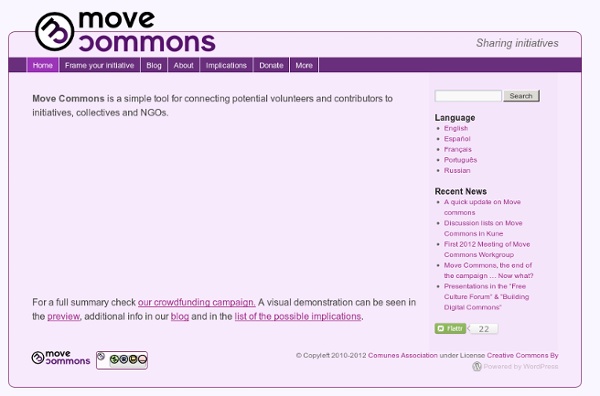



Knowledge Is a Common Good - Transform Network The Effects of the Open Source Movement on the Development of Politics and Society Introduction In October 2009, Transform! co-promoted the first Free Culture Forum (FCF). The FCF is one of the first attempts to create an international space of networking and strategic reflection for a wide range of movements that have emerged across the world in different fields and are related to the production, access, circulation and management of cultural works and knowledge goods. It concluded an intense three days’ work with the release of a Charter for Innovation, Creativity and Access to Knowledge, which condensed demands, principles and concrete actions to differently regulate the legal, political and economical challenges posed by the revolution taking place in the way that knowledge, information and culture are created, accessed and transformed. For Transform! The Free Culture Movements The first to emerge and the most consolidated is the Free and Open Source Software movement (FOSS). Notes
Understanding Knowledge as a Commons Knowledge in digital form offers unprecedented access to information through the Internet but at the same time is subject to ever-greater restrictions through intellectual property legislation, overpatenting, licensing, overpricing, and lack of preservation. Looking at knowledge as a commons—as a shared resource—allows us to understand both its limitless possibilities and what threatens it. In Understanding Knowledge as a Commons, experts from a range of disciplines discuss the knowledge commons in the digital era—how to conceptualize it, protect it, and build it. Contributors consider the concept of the commons historically and offer an analytical framework for understanding knowledge as a shared social-ecological system. They look at ways to guard against enclosure of the knowledge commons, considering, among other topics, the role of research libraries, the advantages of making scholarly material available outside the academy, and the problem of disappearing Web pages.
Towards a Material Commons Transcripted from the original audio by Jane Loes Lipton for Guerrilla Translation!Main image by Stacco TroncosoThis transcript is also available as a Spanish translation Can commons-oriented peer production be applied to material production? In this fascinating conversation hosted by KMO from the C-Realm Podcast, Michel Bauwens, Dmytri Kleiner and John Restakis tackle these questions, and arrive at a series of proposals combining new models of social co-ops with commons-oriented peer production and systems for collective financing. Michel Bauwens, John Restakis, Dmytri Kleiner KMO: You are listening to the C-Realm Podcast, I am your host, KMO, and I am joined from Quito, Ecuador, by Dmytri Kleiner, Michel Bauwens, and John Restakis, so I’ll introduce you each individually. Dmytri: Thank you, KMO. KMO: Say just a little bit more about yourself. Dmytri: I’m a member of the collective called Telekommunisten. Michel Bauwens: Thanks, it’s an honor. KMO: Michel, let’s start with you.
Communicating the Commons << Outline View >> Back to Bubble View This is a work in progress. For the past couple of years I have collated and curated the possibilities, concepts, alternatives that people striving for a 'better world' were working on and talking about in various social network groups dedicated to sustainability, commons, new economy. Additions or changes are welcome here. The goal I thought of for the map is to make it easier: For change agents, activists, innovators, community & social entrepreneurs to recognize which spot or niche they occupy or wish to occupy within the possibility/action space so they can assert their position and adjust their action and discourse in relation to an overarching purpose and what is 'around' them. The map is definitely meant to be a learning tool. For the moment this is a curated map. A simple Pearl Tree is available here.
David Bollier | news and perspectives on the commons SavoirsCom1 Commons In A Box Le Processus du Bien commun ! Ecologie sociale et pluralisme. Common Good Forum L'Écomoneur | Économie politique des (biens) communs Données personnelles : mais de quels droits veut-on encore nous priver ? | L'Écomoneur « Quelle est ici l’histoire. C’est l’histoire de notre Histoire. Celle d’un peuple et d’un pays qui a fait de la liberté son identité et qui aujourd’hui l’abandonne en chemin. Confrontée à la révolution de l’internet, la France a renoncé à maitriser son destin sur les réseaux informatiques. Constatant que "sur le réseau, nous renonçons à être des sujets autogouvernés pour adopter le statut juridique de l’animal domestique : objet vivant à la merci de son propriétaire", Pierre Bellanger propose que nous récupérions notre souveraineté numérique en instaurant une propriété des données personnelles. Il ne s’agirait désormais plus de modérer les abus par les entreprises tout en garantissant certains droits aux utilisateurs, mais bel et bien de permettre aux individus "d’en recueillir la valeur, de les utiliser, d’en interdire l’usage, de les céder et de les détruire". En outre une taxe à l’exportation des données personnelles, de même qu’une digidouane, serait mise en place. Oui.
Commons Shared resources The commons is the cultural and natural resources accessible to all members of a society, including natural materials such as air, water, and a habitable Earth. These resources are held in common even when owned privately or publicly. Definition and modern use[edit] The Digital Library of the Commons defines "commons" as "a general term for shared resources in which each stakeholder has an equal interest".[4] The term "commons" derives from the traditional English legal term for common land, which are also known as "commons", and was popularised in the modern sense as a shared resource term by the ecologist Garrett Hardin in an influential 1968 article called The Tragedy of the Commons. Some texts make a distinction in usage between common ownership of the commons and collective ownership among a group of colleagues, such as in a producers' cooperative. Type[edit] Environmental resource[edit] The examples below illustrate types of environmental commons. Digital commons[edit]